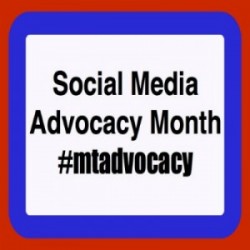As I prepare to bring another group to Thailand in May, I thought it might be nice to "hijack" the blog until that time to help those students (and anyone else who might want to know) understand the program here and what makes it (and music therapy anywhere in the world that occurs) so special. So this is the place you will find stories about my music therapy experiences in Thailand.
 Now on with the show...
Now on with the show...Just in the nick of time (with only 2 days left in the month!), I am devoting this first post to relationship between global outreach and music therapy social media advocacy month.
I enjoy the fact that I get to wear a number of different "hats": as an Associate Professor of Music Therapy at the University of Kansas, as a visiting professor at Mahidol University College of Music in Bangkok, Thailand and as the Regulatory Affairs Advisor for the Certification Board for Music Therapists. While the first two positions seem to go hand-in-hand, my role with CBMT may not seem to be as closely related to the teaching component. When I agreed to take on the challenge of working the State Recognition Operational plan, it was because I believe that advocacy is at the heart of EVERYTHING that we do as music therapists. This thread is the one that links students, clinicians, researchers, professors, clients, and families.
This summer will mark 3 major professional milestones for me. The first is 10 years teaching at KU, the second is 5 years collaborating with Mahidol and the third is 7 years consulting with CBMT. I am amazed at how far we have come as a profession and how many advocates we have gained along the way. It doesn't matter if I am hosting an advocacy training at a conference, talking with my own students or building clinical programs in a far away land, each of these places and the people I encounter have one thing in common: HEART.
The advocacy story that I would like to highlight is the story of Ratchada and Tengmong. During my first 6 month stay here in 2009, I met them and their daughter Kim at one of the hospitals we serve. Both came to the rehabilitation group but had little interaction with each other or anyone else. Within the first few weeks of participating in the music therapy group, Kim reported changes in their behaviors and a new 'spark' from each of them. They never missed a group. Though Rathchada suffered from dementia she was not as agitated after joining the group. Tengmong was able to meet new friends and maintain the friendships outside of the group. What I find most poignant about their story is that this is the story of lots of other clients in lots of other countries and that they are so welcoming and accepting of people outside their native culture. THIS is one of the amazing things about music therapy. The MUSIC does the work. The MUSIC makes the connections and helps to establish and maintain the relationships. People are people are people. So as Social Media Advocacy Month 2013 comes to a close, here's to all of you out there who are great advocates! Thank you for all that you do!